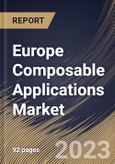The potential to increase developer productivity is one of the main advantages of composable applications in digital transformation. Without even considering data silos, new apps can be quickly incorporated into technology stacks. Automation, skill, ease of use, and agility are just a few advantages composable applications offer. Businesses that use composable infrastructure can quickly develop innovative apps that support various business objectives. These applications receive significant investment from companies to improve focus and establish purpose.
Across the organization, fusion teams with the same corporate objectives are being formed to advance internal innovation and transformation goals. This is expected to help the market to develop. Using composable applications enables businesses to quickly create new or altered applications with the required capabilities. Since applications are represented as building blocks, the development team can reuse the components in other applications in addition to quickly repurposing and rearranging common components to build new apps into bundle business capabilities.
API strategy 2.0 is currently on banks' minds seeking a change and tech-savvy institutions. API strategy 2.0 scales from 10-100 public APIs to thousands of pre-assembled building components by being uniform and consistent. Large banks are also growing this assortment of APIs and services in a manner that will best utilize hard-to-find personnel to increase the utilization of APIs and services inside digital teams and showcase existing capabilities. Due to the trend toward digital banking and the adoption of API strategy 2.0, the market in Europe is projected to grow quickly.
The Germany market dominated the Europe Composable Applications Market by Country in 2022, and would continue to be a dominant market till 2029; thereby, achieving a market value of $856.8 million by 2029. The UK market is anticipated to grow at a CAGR of 16% during (2023-2029). Additionally, The France market would showcase a CAGR of 17.8% during (2023-2029).
Based on Offering, the market is segmented into Platform and Services. Based on Vertical, the market is segmented into BFSI, IT & ITeS, Retail & Ecommerce, Manufacturing, Healthcare & Lifesciences, Government, Energy & Utilities and Others. Based on countries, the market is segmented into Germany, UK, France, Russia, Spain, Italy, and Rest of Europe.
The market research report covers the analysis of key stake holders of the market. Key companies profiled in the report include Salesforce, Inc., Informatica, LLC, Software AG, Nutanix, Inc., Juniper Networks, Inc., Lenovo Group Limited, Western Digital Corporation, Hewlett-Packard Enterprise Company, NetApp, Inc. and Dell Technologies, Inc.
Scope of the Study
By Offering
- Platform
- Services
By Vertical
- BFSI
- IT & ITeS
- Retail & Ecommerce
- Manufacturing
- Healthcare & Lifesciences
- Government
- Energy & Utilities
- Others
By Country
- Germany
- UK
- France
- Russia
- Spain
- Italy
- Rest of Europe
Key Market Players
List of Companies Profiled in the Report:
- Salesforce, Inc.
- Informatica, LLC
- Software AG
- Nutanix, Inc.
- Juniper Networks, Inc.
- Lenovo Group Limited
- Western Digital Corporation
- Hewlett-Packard Enterprise Company
- NetApp, Inc.
- Dell Technologies, Inc.
Unique Offerings
- Exhaustive coverage
- The highest number of Market tables and figures
- Subscription-based model available
- Guaranteed best price
- Assured post sales research support with 10% customization free
Table of Contents
Companies Mentioned
- Salesforce, Inc.
- Informatica, LLC
- Software AG
- Nutanix, Inc.
- Juniper Networks, Inc.
- Lenovo Group Limited
- Western Digital Corporation
- Hewlett-Packard Enterprise Company
- NetApp, Inc.
- Dell Technologies, Inc.








